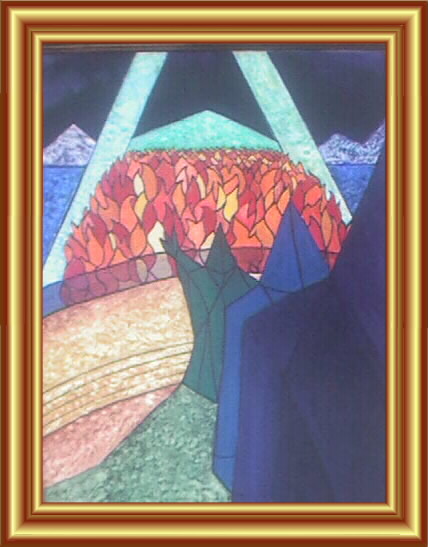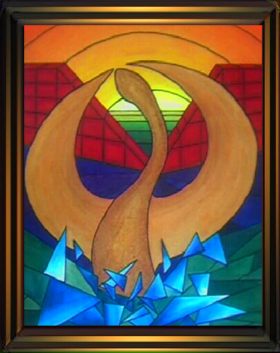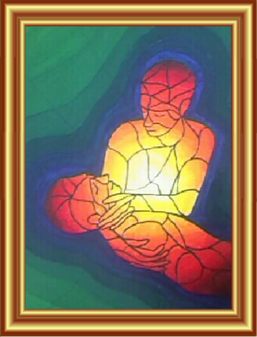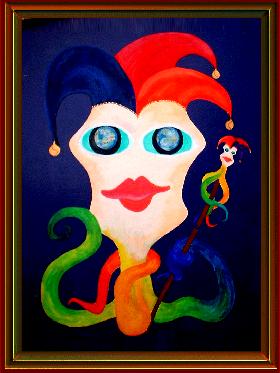
Art, Symbols, Fascination
& The Eternal Love Of The Light
A Retrospective With Silvia Hartmann by Nicola
Quinn
II : Oh My, Aren’t We Colourful!
 NQ:
I’d like to know a little more about your earlier paintings – The
Chalice painting and that entire series.
NQ:
I’d like to know a little more about your earlier paintings – The
Chalice painting and that entire series.
SFX: Oh yes! They were the results of a major mental
breakthrough.
I had a dream about a magicians conference. It was very vivid,
very lucid and it stayed with me and for some reason, I wanted to
remember this, and I wanted to paint it.
I got myself completely involved with a cast of thousands,
because there was the key scene where the magicians were coming out
of the hotel, down the steps and there was this angry crowd, and
policemen holding these people at bay. At one point the leading
magician shook his fist at the crowd, and they went absolutely
berserk and rushed forward into the line of policemen, and that
moment was the highlight of the dream, and I was really fascinated
and wanted to paint that.
I spent ages painting like ten million policemen and a hundred
million members of the crowd, I was driving myself insane!
I filled I don’t know how many massive sheets of this huge block
of paper with designs for this, and I just couldn’t get it right,
and in the end started to seriously think about staging the whole
affair with actors, and photographing it and tracing the photographs
or something.
NQ: Good grief! [laughs]
SFX: But then I got the elusive obvious.
It occurred to me that I could reduce this scene to its main
elements, then take the main elements and translate them into
symbols. And then I would be able to paint that.
So the policemen became a thin blue line, and the angry crowd
became a sea of flames of fires, the magicians became pyramids.
And then I could paint it!
NQ: So these were fairly traditional representations at that
time? The thin blue line for policemen?
 SFX:
Yes, it was the first time I’d ever done that, and it was just a
symbol for a reality that was too complex to be captured in that
way.
SFX:
Yes, it was the first time I’d ever done that, and it was just a
symbol for a reality that was too complex to be captured in that
way.
The important part is to have the symbols in the right
relationship to each other, it was very specific how the line moved,
and how the crowd was behaving, so the placements of the symbols
were very specific in that way.
And this really worked, the picture really works and I was
completely astonished and I thought, “Now I can paint ANYTHING!”
Anything at all!
There is nothing that’s too complicated, or too difficult,
because I can just reduce it to a symbol or description.
NQ: So that was really a breakthrough.
SFX: Oh absolutely and completely! And once I got my head around
this, all the things I had always wanted to paint all of a sudden
became – available!
Even complicated things like Dragon Rising.
 I
had this dream about a frozen lake, no, a lake made of glass and
this golden dragon just broke through it, and as it did, the earth
shook and the walls fell down.
I
had this dream about a frozen lake, no, a lake made of glass and
this golden dragon just broke through it, and as it did, the earth
shook and the walls fell down.
A pretty dramatic thing!
You need Cecil B DeMille by your side for that one – or you can
reduce it down to a symbol.
And when you do that, then you can paint it – even if you can’t
paint!
NQ: That’s wonderful!
SFX: Yes, it is!
It is really absolutely wonderful!
Marvellous! And I really enjoyed this and did my first public
exhibition of large acrylics at that time.
NQ: And how was that received?
SF [laughs for a considerable time]
Aaah ... well it was interesting.
The six year old son of the gallery owner said, “This is the best
exhibition we’ve ever had, can I have that fish, I want to take it
home please!” and I really enjoyed that comment.
 I
took that for a huge endorsement. If a little kid can get something
out of that, then we are halfway there.
I
took that for a huge endorsement. If a little kid can get something
out of that, then we are halfway there.
The chairman of the local arts council outfit walked in, well,
she didn’t actually walk in, she opened the door a bit, looked
inside, went, “Oh my, aren’t we colourful!” – backed straight out
again and then ran away, down the stairs.
NQ: How rude!
SFX: Well it was incredibly funny, actually. It echoed round the
room and with that upper class accent on it, it was pythonesque. “Oh
my, aren’t we colourful!”
NQ: The colours must have scared her, too much brightness, too
many colours.
SFX: Yeah, too much energy I guess. I think they were used to
flying ducks or something, I can’t really know.
 What encouraged me quite nicely was one guy there, he was an
artist himself and also an art teacher, and he was kind. Not only
was he kind, he was genuinely intrigued. And interested. I like
people who have the ability to become fascinated. Not just judge you
up front but to look at the thing and become fascinated by it,
interested in it.
What encouraged me quite nicely was one guy there, he was an
artist himself and also an art teacher, and he was kind. Not only
was he kind, he was genuinely intrigued. And interested. I like
people who have the ability to become fascinated. Not just judge you
up front but to look at the thing and become fascinated by it,
interested in it.
At one point I went into the half hour diatribe on how things
change and morph in a liquid fashion in my head and how it is
difficult to decide which stage of unfoldment to take and lock down
into a painting, and how I do that process of deciding where to stop
time. He was standing there with his mouth open and when I was done,
shook my hand and went away; I have a notion in order to do some
thing he had gotten an idea for whilst I was talking.
Here, at that time, there was a local women’s art group at work.
They were called Women On The Verge. One of the ladies from the
group was at my exhibition and she invited me to join the group,
which I thought was really nice of her.
So I went to see an exhibition they had put on together a few
weeks later but I was just so appalled by what I saw that I decided
not to join them.
There were two things.
One was that I didn’t like the way it wasn’t really focussed.
I had this feeling that they were trying to do abstract art, but
they were just making backgrounds, if you know what I mean. As
though the point of the painting was missing. A lot of the paintings
looked like beautiful backgrounds which were just waiting for
someone to come along and finish the picture, to add the essential
something that would give them a meaning, a reality or an existence
of some kind.
The other thing that worried me was that they were all pretty
much the same.
I guess that happens in a group.
 You
exchange all the ideas you have in the group, and then everyone has
all the same ideas, and everyone ends up painting the same thing!
You
exchange all the ideas you have in the group, and then everyone has
all the same ideas, and everyone ends up painting the same thing!
I felt threatened by that.
I was worried that I would be vulnerable to the approval of the
group; that there was clearly some major if unconscious group
consensus on what you could do and what you couldn’t do.
I’m very responsive and susceptible to feedback, criticism and
praise alike and at that time didn’t feel that I was settled enough
within my own ideas to hold my own against the peer pressure of a
group, and so I didn’t join.









